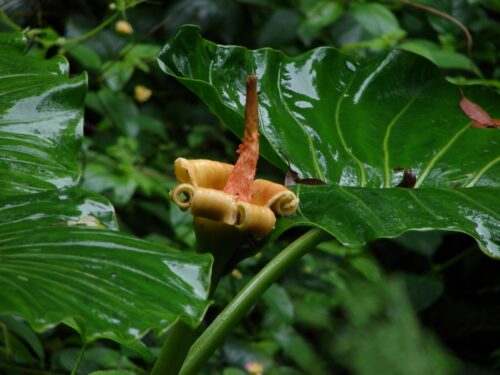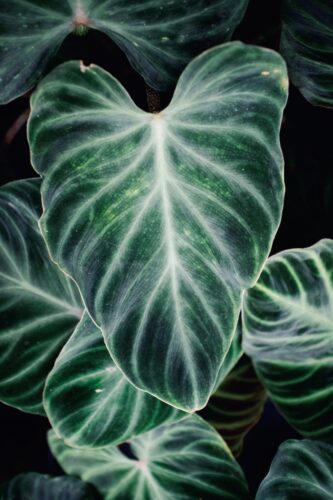If your dog eats elephant ear plants, you need to check for symptoms like oral irritation, vomiting, and difficulty swallowing. Also visit a veterinary doctor who can start treatments such as IV fluid administration, vital sign monitoring, and supportive care. Antihistamines and preventative measures may also be beneficial for the treatment of Alocasia poisoning in dogs.
Alocasia (Elephant Ear) Poisoning in Dogs
Here is the recommended course of action for the treatment of Alocasia poisoning in dogs:
- Contact your veterinarian or the closest emergency animal clinic as soon as you think or see your dog consuming any portion of the elephant ear plant. Tell them the plant you consumed and any symptoms you noticed.
- Contrary to several other forms of poisoning, it is not advisable to induce vomiting in instances of alocasia poisoning. During the vomiting process, the plant’s poisons might further harm the mouth and esophagus.
- When your dog first arrives at the veterinary facility, the doctor will start giving him intravenous (IV) fluids. IV fluids assist in flushing the dog’s system of the toxins and fend against dehydration, which is frequent in poisoning instances.
- Monitoring Vital Signs: In order to determine your dog’s general health and the severity of the poisoning, the veterinarian will carefully monitor all of their vital signs. Body temperature, blood pressure, heart rate, respirations, and oxygen levels are examples of vital indicators. This monitoring aids in spotting any unfavorable effects or problems and guarantees the right kind of medical attention.
- Supportive treatment: The veterinarian may provide further supportive treatment, depending on the severity of the poisoning. This may include taking pharmaceuticals to manage the symptoms, such as antiemetics to stop vomiting or antidiarrheal pills.
- Administering activated charcoal: The veterinarian may sometimes use activated charcoal to remove any toxins still present in the dog’s digestive system and prevent them from entering the bloodstream.
- Symptomatic Management: Particular therapies may be given to help your dog manage his symptoms. Depending on the requirements of each dog, this can include pain management, anti-inflammatory drugs, or other therapies.
- Hospitalization is possible in severe instances of alocasia poisoning in order to get intensive treatment and ongoing observation. Depending on how well your dog reacts to treatment and how they are doing overall will determine how long they stay at the hospital.
- After your dog has recovered, it is crucial to take preventative action to avoid further instances of poisoning. Make careful to keep any potentially harmful plants, such as Alocasia, out of your dog’s reach. Find out which common houseplants are poisonous to animals, then get rid of them or relocate them out of your dog’s reach.
The Dangers of Dogs Eating Elephant Ear Plants
If a dog ingests an elephant ear plant, it can lead to serious health complications and even become fatal if not promptly treated. Elephant ear plants have calcium oxalate crystals in their stems and leaves that are insoluble and very harmful to dogs and cats. These crystals are generated when a dog eats or bites into this plant, irritating the mouth and gastrointestinal system tissues and penetrating them.

The canine could drool excessively and show indications of pain as a result of the acute symptoms of ingestion, which include increased salivation, trouble swallowing, and oral irritation. As the body works to remove the poisonous materials, vomiting is another typical reaction.
A modest quantity of the plant may cause the dog to have moderate gastrointestinal discomfort, which might result in upset stomach. Larger amounts might have negative effects, however. Dyspnea, which is characterized by the dog’s frequent shallow gasps and may be fatal, may be present.

Eating elephant ear plants may result in convulsions, digestive problems, and possibly renal failure in addition to respiratory and intestinal problems. In such cases, it is essential to seek emergency veterinarian care since the symptoms might worsen quickly. You must call your veterinarian right away if you think your dog may have eaten any part of an elephant ear plant.
The quantity of the plant consumed and the size of the dog both affect how severe the response is. Larger dogs may need to consume more of the poisonous herb in order to exhibit severe effects, whilst smaller dogs may have more acute symptoms with lesser doses.
Pet owners should use caution while handling the common plant fiddle leaf since it may be poisonous to both dogs and cats. Fiddle Leaf is a possible threat if not maintained out of reach of pets since it is simple to grow and often found in houses, unlike elephant ear plants.
It’s crucial to be knowledgeable about the plants you have in your house and yard in order to safeguard your pets from the risks posed by these hazardous plants. Keep poisonous plants out of reach of pets, and call your veterinarian right once if you believe your pet has consumed any poisonous plants.
To ensure the safety and wellbeing of our cherished animal friends, it is essential for us as responsible pet owners to be knowledgeable about possible dangers like hazardous plants. The best defense against injury from consuming dangerous things like elephant ear plants is prevention and prompt response.
How Long Does Elephant Ear Poisoning Last?

Normally, An Elephant ear Poisoning lasts just for a short time. In milder situations, the symptoms could go away on their own in a day or two without any special medical care. However, in more serious situations, the symptoms could last a few days before progressively going away. It is essential to see a doctor since they may provide therapy and supportive care to ease symptoms and avoid problems.
Elephant ear poisoning often causes acute symptoms that show up quickly after intake. The person who has consumed the plant may begin to feel uncomfortable and exhibit other symptoms within a few hours. Depending on the quantity consumed and the individual’s susceptibility to the poisonous substances, the severity of the symptoms might range from mild to severe.
Are Elephant Ears Safe for Dogs and Cats?
No, elephant ears is not safe because it causes vomiting, oral irritation, increased salivation, and trouble swallowing for dogs and cats. They suffer terrible oral burning and irritation from the poisonous calcium oxalate crystals, which causes anguish and discomfort. When things are bad, if you don’t get the right medical help right away, the repercussions might be lethal.
Animals by nature are inquisitive, thus pets could be enticed to investigate and sample different plants around the home. However, it is essential for us to be conscious of any possible risks in our environment as responsible pet owners. Animals that consume elephant ear plant components may have a variety of negative side effects.
The poisonous effects of the elephant ear plant may affect both dogs and cats. Particularly vulnerable to the plant’s poisons are cats, who may have negative effects even from little contact with the leaves. It is crucial to get a pet to the vet right away if they come into touch with or eat any part of the plant.
For quick action, it is essential to recognize the signs of plant poisoning in animals. Watch out for symptoms like excessive drooling, pawing at the mouth, trouble breathing, and other indications of discomfort if you think your pet may have ingested or come into contact with elephant ear plant components. For advice on what to do next, don’t hesitate to get in touch with your veterinarian or a pet poison hotline.
It is necessary to take preventative action to avoid plant poisoning situations. Both inside and outdoors, pet owners should take precautions to keep potentially harmful plants like elephant ear out of the reach of their animals. Additionally, taking the effort to instruct dogs to avoid interacting with or chewing on plants might be useful in avoiding possible risks.
What to Do If Your Dog Ingests Alocasia Leaf Moisture
In most cases, if a dog ingests a small amount of the moisture, it may not lead to severe toxicity. However, it is still a good idea to exercise caution and vigilance. Keep a watch out for any odd actions or symptoms in your dog that might point to an unpleasant response. You may keep watching your dog at home if they seem unaffected and exhibit no indications of discomfort.
However, it is critical to seek urgent veterinarian care if your dog displays any of the following signs after consuming the Alocasia leaf moisture:
- Vomiting: If your dog vomits, it might mean that their body is attempting to rid itself of the poisons they consumed.
- Diarrhea: It’s critical to treat this symptom quickly since it might cause dehydration and other problems.
- Lethargy: If your dog exhibits odd signs of fatigue or sluggish behavior, it may be a sign that the toxins in the plant are having a bad impact on their health.
- Loss of Appetite: It’s important to pay attention to any signs of diminished or total loss of appetite since they are potentially serious.
Do not hesitate to call your veterinarian or the nearest animal emergency facility if you believe your dog has swallowed more Alocasia leaf moisture or is exhibiting any of the symptoms listed above. They can decide on the best course of action if you provide them as much information as you can about the occurrence, such as the plant involved and the quantity swallowed.
To control symptoms and assure your dog’s recovery, the veterinarian therapy may include inducing vomiting, using activated charcoal to absorb toxins, and providing supportive care. To minimize any difficulties during treatment, it is essential to get help as soon as you can.
For your dog’s safety, prevention is always the best course of action. Make sure that any aloe vera or other potentially harmful plants are out of your dog’s reach if you have them in your house or yard. Additionally, familiarize yourself with dangerous plants’ signs and symptoms so you can respond quickly in the event of an unpleasant incidence.
Are Elephant Ears Poisonous to Pets?

Yes, Elephant Ears Poisonous to Pets. There may be a number of negative consequences if a dog or cat, for example, eats any of the Elephant Ear plant’s components. Increased salivation, trouble swallowing, oral irritability, and vomiting are among the most typical signs of ingestion. The presence of certain poisonous chemicals inside the plant is what predominantly causes these responses.
Calcium oxalate crystals are among the main poisons detected in elephant ear. The leaves, stems, and tubers of the plant all have these tiny crystals that resemble needles. The crystals in these plant parts may irritate the mouth, throat, and gastrointestinal system mechanically in dogs that chew or consume them, resulting in the aforementioned symptoms.
Depending on the amount taken and the size of the animal, the severity of the pet’s response to elephant ear ingestion might vary. Even a modest bit of the plant may cause symptoms to become more severe in smaller animals. Larger animals, however, could be able to ingest more before exhibiting any harmful effects.
It is critical to seek prompt veterinarian care if a pet owner believes that their animal companion has eaten elephant ear or observes any of the aforementioned symptoms. Quick medical attention may lessen the consequences of poisoning and stop any future problems.
It is crucial for pet owners to adopt safety measures to protect their animals from dangerous plant poisons. It is important to check their toxicity and see whether they represent a harm to animals before adding new plants to the house or yard. If a person currently has an Elephant Ear plant and pets, it is best to keep the plant out of the reach of the animals or to think about using pet-friendly plants as a substitute.
Are Elephant Ears Poisonous?
Yes, Elephant Ears are poisonous orally to human and children if they touch any part of it, then it causes inching, irritation and rash. No major symptoms, even the leaves of elephant ears are edible when cooked properly. In case of animals such as dog and cats – Any portion of the elephant ear plant that your pet consumes might cause a number of negative side effects. This poisonous plant may make dogs vomit, salivate more, have trouble swallowing, and have mouth discomfort. Depending on the quantity swallowed and the size of the animal, the consequences might vary from minor discomfort to severe responses.
Elephant ear plants have calcium oxalate crystals in their tissues, which is the cause of their toxicity. Animals’ mouths, throats, and digestive tracts may become irritated and inflamed because of these prickly, needle-like crystals. These crystals come into touch with the delicate mucous membranes of the animal that consumed the plant, causing the symptoms to manifest.
In more extreme situations, consuming large amounts of elephant ear plants may cause more serious symptoms, including breathing problems, throat swelling, and even potentially fatal responses. If a pet owner suspects their animal has eaten any part of the elephant ear plant, they must be aware of the symptoms of plant poisoning and seek quick veterinarian care.
It is essential to prevent such events in order to protect our animal friends’ safety and wellbeing. Keep dogs and small children away from elephant ear plants if you have them at home or in your garden. To avoid inadvertent consumption, elevating the plant or putting up barriers may be successful defenses.
Equally crucial is being knowledgeable about the numerous poisonous plants that can be in your living area. You may recognize possible threats and respond quickly if an event happens by being aware of the look of elephant ear plants and their other names.
Conclusion
Dogs may suffer from unpleasant oral irritation and discomfort from alocasia (elephant ear) poisoning. Get your pet to the doctor right away if you think they may have consumed this poisonous plant. Potential risks to your canine friend’s health may be avoided by exercising caution and being knowledgeable about hazardous plants. Always put your dog’s safety and wellbeing first by making your home pet-friendly and getting aid from a professional when required.
Related Post:
Elephant Ear Plant: How to Grow And Care, Benefits, Propagation
Fungal Leaf Blight Elephant Ear Treatment (& White Spots Fix)
